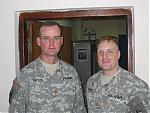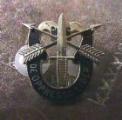Personally favor the human element of warfighting for most operations. Technological wonders, computerised warfighting & strategic metrics could be relegated to the higher echelon planning sections where they have great impact already.
Present emphasis revolves around the forcing of common operational picture, shared environmentals, artificially delegated communications & long distance micromanagement through observation.
Am convinced General Patton was correct on the non-wonderful nature of the so-called wonder weapons which threaten to dehumanise the military. Choose to focus on individual human attainment & its effect on national greatness/goodness.








Bookmarks